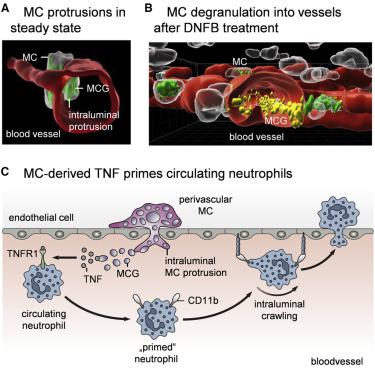Immunity ( IF 32.4 ) Pub Date : 2021-01-22 , DOI: 10.1016/j.immuni.2020.12.017 Jan Dudeck 1 , Johanna Kotrba 2 , Roland Immler 3 , Aaron Hoffmann 2 , Martin Voss 2 , Vasileia Ismini Alexaki 4 , Lorena Morton 5 , Stephan René Jahn 6 , Konstantinos Katsoulis-Dimitriou 2 , Simon Winzer 7 , Georg Kollias 8 , Thomas Fischer 9 , Sergei A Nedospasov 10 , Ildiko Rita Dunay 5 , Triantafyllos Chavakis 4 , Andreas J Müller 11 , Burkhart Schraven 1 , Markus Sperandio 3 , Anne Dudeck 1

|
Tissue resident mast cells (MCs) rapidly initiate neutrophil infiltration upon inflammatory insult, yet the molecular mechanism is still unknown. Here, we demonstrated that MC-derived tumor necrosis factor (TNF) was crucial for neutrophil extravasation to sites of contact hypersensitivity-induced skin inflammation by promoting intraluminal crawling. MC-derived TNF directly primed circulating neutrophils via TNF receptor-1 (TNFR1) while being dispensable for endothelial cell activation. The MC-derived TNF was infused into the bloodstream by directional degranulation of perivascular MCs that were part of the vascular unit with access to the vessel lumen. Consistently, intravenous administration of MC granules boosted neutrophil extravasation. Pronounced and rapid intravascular MC degranulation was also observed upon IgE crosslinking or LPs challenge indicating a universal MC potential. Consequently, the directional MC degranulation of pro-inflammatory mediators into the bloodstream may represent an important target for therapeutic approaches aimed at dampening cytokine storm syndromes or shock symptoms, or intentionally pushing immune defense.
中文翻译:

肿瘤坏死因子定向肥大细胞脱颗粒进入血管引发中性粒细胞外渗
组织驻留肥大细胞 (MCs) 在炎症损伤后迅速启动中性粒细胞浸润,但分子机制尚不清楚。在这里,我们证明了 MC 衍生的肿瘤坏死因子 (TNF) 通过促进腔内爬行对中性粒细胞外渗到接触性过敏引起的皮肤炎症部位至关重要。MC 衍生的 TNF 通过 TNF 受体-1 (TNFR1) 直接引发循环中性粒细胞,同时对内皮细胞活化而言是可有可无的。MC 衍生的 TNF 通过血管周围 MC 的定向脱粒注入血流,该 MC 是血管单元的一部分,可进入血管腔。一致地,MC 颗粒的静脉内给药促进中性粒细胞外渗。在 IgE 交联或 LPs 挑战时也观察到明显和快速的血管内 MC 脱颗粒,表明具有普遍的 MC 潜力。因此,促炎介质定向 MC 脱颗粒进入血流可能代表治疗方法的一个重要目标,旨在抑制细胞因子风暴综合征或休克症状,或有意推动免疫防御。


























 京公网安备 11010802027423号
京公网安备 11010802027423号